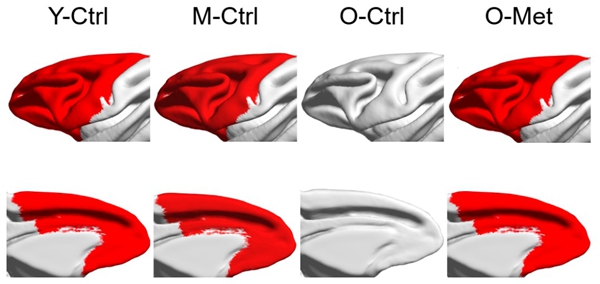A pivotal discovery in aging research by a Chinese Academy of Sciences (CAS) team has shown that metformin, commonly used for type 2 diabetes, can alleviate cellular senescence, markedly slowing down the aging process in primates. This breakthrough offers fresh insights into aging biology and holds promise for developing interventions for human aging.
Is aging reversible? This timeless question has now found an answer in the laboratories of scientists from CAS. A collaborative effort between LIU Guanghui's team from the Institute of Zoology, CAS, and ZHANG Weiqi’s team from the Beijing Institute of Genomics (National Center for Bioinformation), along with QU Jing’s team from the Institute of Zoology, CAS, has led to a study published in Cell. The research confirms the potential of metformin in combating aging in primates.
Aging is characterized by a decline in organ function and an increased risk of various diseases. To reduce the strain on healthcare systems, scientists have been searching for effective methods to delay aging. The Macaca fascicularis, with its physiological and functional similarities to humans, serves as an excellent model for aging studies.
In this study, the researchers employed a multidisciplinary approach, including physiological assessments, medical imaging, multi-parameter blood tests, multi-tissue pathological analysis, and multi-omics, to monitor the metformin-treated male monkeys over 40 months. The findings reveal that extended metformin therapy yielded geroprotective benefits, notably mitigating brain cortex atrophy, boosting cognitive abilities, slowing periodontal bone deterioration, and augmenting the preservation of various tissues and organs, including the liver, heart, lungs, intestines, and muscle tissue.
The study revealed that metformin's protective effect against aging is independent of its traditional role in blood sugar and metabolic regulation. It acts directly on neurons, activating the Nrf2-mediated antioxidant gene expression network, thereby delaying cellular aging. This finding provides a scientific basis for the geroprotective mechanism of metformin and guides the development of aging intervention drugs.
The research team also utilized machine learning models to build a multi-dimensional primate tissue and organ aging assessment model, accurately evaluating the systemic effects of metformin in delaying aging. The study found that metformin can reduce biological age indicators in primates, including multi-tissue DNA methylation age and transcriptome age, as well as plasma protein and metabolite age, with the most pronounced effect being up to six years, equivalent to 18 human years. This geroprotective effect was particularly significant in the frontal lobe area of the brain and the liver. High-precision single-cell aging clock assessments showed that metformin significantly delayed the aging process of various nerve cells in the brain and hepatocytes in the liver, effectively slowing down the aging speed of these cells by 5 to 6 years, translating to approximately 15 to 18 years in human terms.
This study not only injects new vitality into the field of aging intervention but also establishes new paradigms and standards for evaluating the efficacy and safety of human aging interventions. It signifies an important step forward in the quest to delay human aging, with geriatric medicine research gradually shifting focus from treating individual chronic diseases to systemic intervention against aging. Metformin may emerge as a vital tool in the battle against human aging, opening new pathways for the prevention and treatment of aging-related diseases.
LIU Guanghui, a researcher at the Institute of Zoology, CAS, ZHANG Weiqi, a researcher at the Beijing Institute of Genomics, CAS, and QU Jing, a researcher at the Institute of Zoology, CAS, are the co-corresponding authors of this paper. YANG Yuanhan, a doctoral student at the Institute of Zoology, CAS, LU Xiaoyong, a master's student at the Beijing Institute of Genomics, CAS, LIU Ning, a researcher at the Institute of Biophysics, CAS, MA Shuai, an associate researcher at the Institute of Zoology, CAS, ZHANG Hui, an assistant researcher at the Second Hospital of Capital Medical University, and ZHANG Zhiyi, an associate researcher at the Institute of Biophysics, CAS, are the co-first authors of the paper.
Article link: https://doi.org/10.1016/j.cell.2024.08.021

Figure 1. Metformin Slows Brain Aging in Primates(Image from LIU Guanghui's lab)

